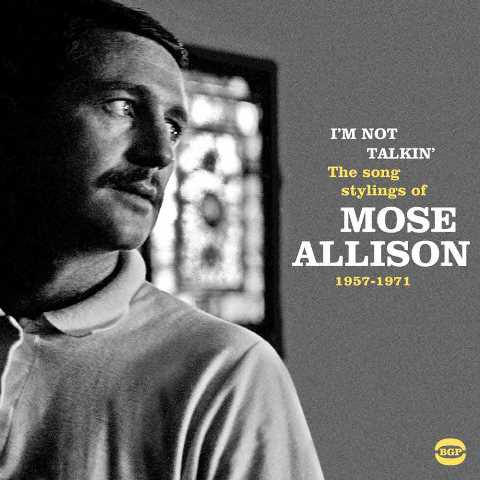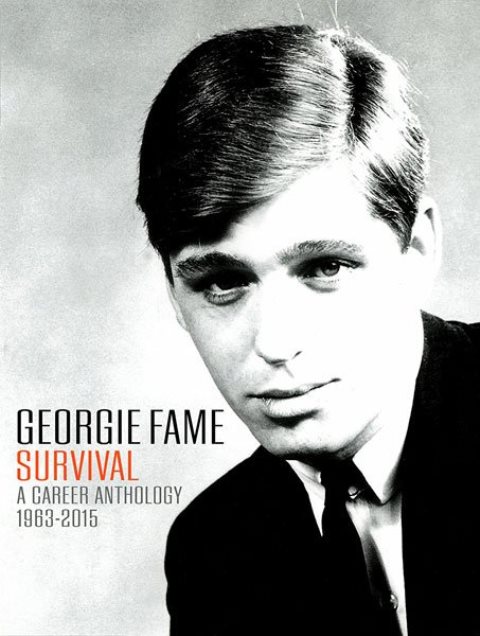In 1970, The Who opened their Live at Leeds album with “Young Man Blues”, a hefty version of a song its composer Mose Allison recorded as “Blues” in 1957. Back then, it was the only vocal track on Back Country Suite, an otherwise instrumental blues-jazz album, the Mississippi-born pianist's debut long player. Allison had moved to New York in 1956 and a string of releases followed. The Who weren’t the only British band cocking an ear: in March 1965 The Yardbirds first recorded Allison's “I’m Not Talking”, plucked by them from 1964’s The Word From Mose.
Mose Allison’s music was integral to the British mod-beat-R&B scene and exerted a massive influence on Georgie Fame, a musician more obviously jazzy than either The Who and The Yardbirds. It went further: his 1958 composition “If You Live” was a staple in early live sets by San Francisco’s Quicksilver Messenger Service.
 For non-completists, getting handle on Allison has previously been difficult as a concise, single-disc collection compiled with an eye towards his influence on British music has been lacking until now. The splendid I'm Not Talkin': The Song Stylings Of Mose Allison 1957–1972 plugs this gap. Providentially, it arrives almost concurrently with Survival: A Career Anthology 1963–2015, an elegant eight-disc box set covering Georgie Fame’s career from the point he ceased being a sideman for Joe Brown, Billy Fury and Marty Wilde, and visiting Americans Eddie Cochran and Gene Vincent. Fame has remarked of Allison that (early on) he “was accused of copying him. I was. I was trying to get as close to Mose Allison as I could.” Fame moved on and developed, but Allison remained in his make-up.
For non-completists, getting handle on Allison has previously been difficult as a concise, single-disc collection compiled with an eye towards his influence on British music has been lacking until now. The splendid I'm Not Talkin': The Song Stylings Of Mose Allison 1957–1972 plugs this gap. Providentially, it arrives almost concurrently with Survival: A Career Anthology 1963–2015, an elegant eight-disc box set covering Georgie Fame’s career from the point he ceased being a sideman for Joe Brown, Billy Fury and Marty Wilde, and visiting Americans Eddie Cochran and Gene Vincent. Fame has remarked of Allison that (early on) he “was accused of copying him. I was. I was trying to get as close to Mose Allison as I could.” Fame moved on and developed, but Allison remained in his make-up.
I'm Not Talkin' collects 24 tracks from 1957 to 1971, over which Allison recorded for four labels: Prestige, Columbia, Epic and Atlantic. His favoured means of getting the music across was as a pianist in a trio but, in the early Seventies, he also played an electric piano and worked with a filled-out band. Such a sweep suggests I'm Not Talkin' could be a disparate experience and not hang together. In the event, it’s a unified listen. It also has good, enthusiastic liner notes.
This reading of the Allison oeuvre reveals why he was so attractive to rock bands and an outfit like Fame’s Blue Flames, who aimed to get club-goer's feet moving. Each song enviably marries groove to melody, with a clear delineation between the role of each instrument in the whole. The original of “I’m Not Talking” is cool, with none of the barely-supressed aggression of The Yardbirds’ version but the debt of Jeff Beck’s guitar to Allison’s piano is made manifest. I'm Not Talkin' raises the question of why more of these hip, terrific songs were not covered.
Fame met Allison at Richmond’s National Jazz & Blues Festival in August 1964. The Eric Clapton-era Yardbirds were also on the bill, as were The Graham Bond Organisation, The Mike Cotton Jazzmen and Manfred Mann, all of whom must have taken notes during Allison’s set. By this point, though, Fame had already set his musical stall and Rhythm and Blues at the Flamingo, his debut album, was in the shops.
 Survival arrives after the five-disc box set The Whole World’s Shaking – The Complete Recordings 1963–1966, issued earlier this year. This seems back-to-front: a career-spanning anthology rather than a period-specific box set makes more sense as an opening shot in writing a musical narrative. Inevitably, The Whole World’s Shaking has stolen some of Survival’s thunder. This notwithstanding, Survival is as well packaged as The Whole World’s Shaking, as well annotated, comes with a proper 48-page book and is obviously created with care. If recent history can be re-written, the new release should be the entry point into Fame’s world.
Survival arrives after the five-disc box set The Whole World’s Shaking – The Complete Recordings 1963–1966, issued earlier this year. This seems back-to-front: a career-spanning anthology rather than a period-specific box set makes more sense as an opening shot in writing a musical narrative. Inevitably, The Whole World’s Shaking has stolen some of Survival’s thunder. This notwithstanding, Survival is as well packaged as The Whole World’s Shaking, as well annotated, comes with a proper 48-page book and is obviously created with care. If recent history can be re-written, the new release should be the entry point into Fame’s world.
And what a world. The six discs take it from 1963 to 2015, scooping up everything from (yes) Allison-tinged groovers to experimentation with semi-orchestral band line-ups and beyond. Though jazz and blues are the roots, Fame’s approach to his music has always been elastic. When he was on Island Records, for just one album in 1974, label boss Chris Blackwell told him he was too eclectic. That eponymous set ended with "Survlval". Borrowing the song's title for this set has to be ironic.
Pointing to highlights is invidious but Disc Four’s previously unreleased seven-track live recording of a September 18, 1974 show at London’s Lyceum is sensational. At the show, as part of a bedrock quintet Fame is supported by a seven-piece wind section and a percussionist. Though a version of Allison’s “Parchman Farm” is performed, this is jazz as dance music and, as such, irresistible. It also has little to do with 1974’s prevailing trends. Next, side-step the 1967 chart-topper "The Ballad of Bonnie and Clyde" to dig the superb 1969 version of Kenny Rankin's "Peaceful" and then track back to start from the beginning.
Georgie Fame’s Survival: A Career Anthology 1963–2015 is an overdue tribute to a wilful British great. I'm Not Talkin': The Song Stylings of Mose Allison 1957–1972 is a fantastic introduction to a composer-performer for whom it feels due has not been given. Each of these complementary collections is indispensable.















Add comment